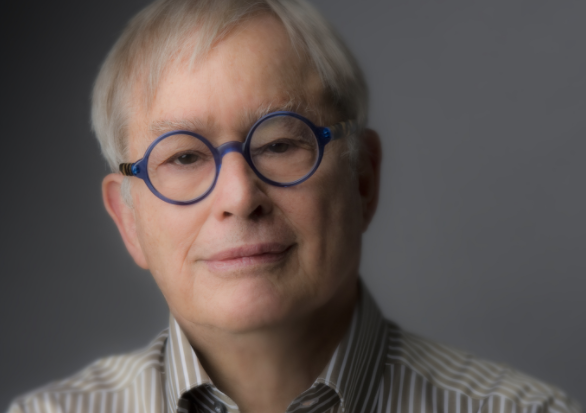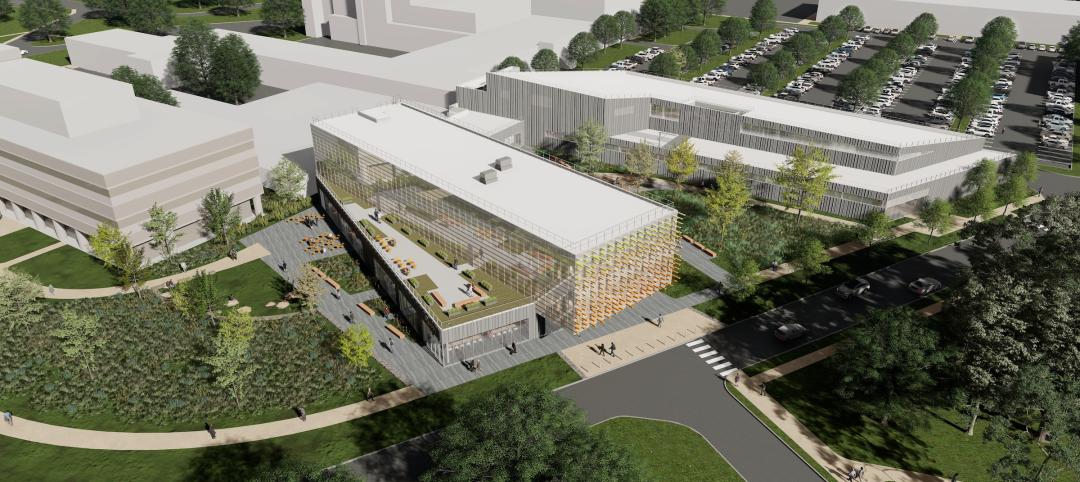ZGF Founding Design Partner, Robert Frasca, FAIA, passed away on January 3 in Portland, Ore., at the age of 84 from complications of CLL (chronic lymphocytic leukemia).
Frasca was a driving force in transforming the architectural firm from its early beginnings as a regional office into one of the nation’s largest practices, with 600 design professionals across six offices in the U.S. and Canada. Based on a portfolio of work under Frasca’s direction, ZGF was honored with the prestigious AIA Architecture Firm Award in 1991.
Encouraged by his mentor, Pietro Belluschi, Frasca arrived in Portland in 1959, equipped with a Master of City Planning from the Massachusetts Institute of Technology (1959), where Belluschi was Dean. He received his Bachelor of Architecture from the University of Michigan in 1957. He worked part time at the firm Wolff and Zimmer Architects and part time at the City Planning Commission. Several months later Frasca was awarded the George G. Booth Traveling Fellowship from the University of Michigan, given to an outstanding graduate, and traveled throughout Europe. On returning to Portland (Norm Zimmer sent him a one-way ticket), Frasca rejoined Zimmer and, along with Brooks Gunsul, formed the firm, Zimmer Gunsul Frasca (1966).
In an era when buildings were most often conceived as isolated monuments with little regard to the surrounding urban fabric, Frasca innately understood the importance of a strong and dynamic architecture to unite the entire community. He quickly became the consummate “Citizen Architect” creating notable work that ranged from civic and institutional master plans to individual buildings that elevated the quality of the built environment and the overall urban experience.
He played an important role in the evolution of Portland as a livable city and was instrumental in shaping its skyline and integrative spirit. He designed many of Portland’s most important civic projects, including Waterfront Park, Oregon Historical Society, Oregon Museum of Science and Industry, Justice Center, Oregon Convention Center, and Portland International Airport—the latter consistently ranked as one of the country’s most admired airports.
 Frasca designed many of Portland, Ore.’s most important civic projects, including the Portland International Airport. Photo courtesy ZGF
Frasca designed many of Portland, Ore.’s most important civic projects, including the Portland International Airport. Photo courtesy ZGF
He executed the master plan and designed many buildings for Reed College and for Oregon Health & Science University (OHSU), as well as the Multnomah Athletic Club, KOIN Tower, and Portland General Electric’s headquarters (now the World Trade Center).
Expanding on his integrative design approach, Frasca pioneered a holistic and humane architectural understanding of research facilities and pediatric hospitals—one that focused on occupant wellness and intellectual collaborations in the service of scientific discoveries and positive patient outcomes for the world’s most pressing diseases. He integrated nature, healing gardens, and art into his buildings long before research proved their importance. The first buildings of this type that he designed were the Vollum Institute and Doernbecher Children’s Hospital at OHSU. These buildings put ZGF on the map, and shortly other institutions were seeking their expertise. These included Children’s Hospital of Los Angeles, Children’s Hospital Colorado in Denver, Fred Hutchinson Cancer Research Center in Seattle, the National Institutes of Health in Bethesda, the Mortimer B. Zuckerman Research Center at Memorial Sloan-Kettering Cancer Center in New York City, the Dana-Farber Yawkey Cancer Institute, Center for Cancer Care in Boston, The Max Planck Institute for Neuroscience in Florida, and the Carnegie Institute for Science in Baltimore.
As his reputation grew, Frasca designed science and engineering buildings, medical school buildings, and research facilities for premier universities across the country, including the University of California-Berkeley, Cornell University, Duke University, Stanford University, Williams College, Emory University, and Johns Hopkins University. The Robert Mondavi Wine and Food Institute at the University of California Davis combined his love of wine, food, and science. These facilities always focused on the student and faculty experience using great landscape, natural light, atrium spaces, informal study and lounge areas, and places to meet serendipitously.
Working with the State Department in their Design Excellence program, Frasca designed U.S. embassies and consulates in Istanbul, Sofia, and Cape Town, South Africa. A unique project was the LDS Conference Center in Salt Lake City across Temple Square from the Mormon Tabernacle, with seating for 21,000 and a four-acre green roof garden designed with landscape architect Laurie Olin, a frequent collaborator.
He was committed to designing work that enhanced collaboration, and the team-based approach he nurtured at ZGF allowed countless young designers to grow and thrive at the firm. In addition to his practice at ZGF, Frasca shared his expertise with students and the broader profession including chairing the AIA National Honor Awards program, the AIA Committee on Design, and the AIA Topaz Awards program. He served on multiple jury selection committees, and performed peer reviews for numerous projects. He also spent 27 years on the University of Washington Architecture Commission, shaping that campus by championing other talented designers.
Frasca was born in Niagara Falls, N.Y., to parents who immigrated from Italy. He is survived by his wife, Jeanne Giordano, his children Andrea and Jason by his first marriage to Marilyn Buys (deceased in 2000), his grandson Nicolas, his sister Joyce Broderson, his nephew, David, and sister-in-law, Lorraine Giordano.
Donations in memory of Bob Frasca can be made to:
The Trustees of Columbia University
Notation: Dr. Nicole Lamanna CLL Research Gift Fund/memory of Bob Frasca
Marilyn Mullins
Senior Director of Development
Columbia University Medical Center
100 Haven Avenue, Suite 29D
New York, NY 10032
Related Stories
Women in Design+Construction | May 28, 2024
Commerce Department launches Million Women in Construction Community Pledge
The U.S. Department of Commerce launched its Million Women in Construction Community Pledge this month to boost the ranks of women in construction companies. Federal investments are creating a construction boom that is increasing job opportunities for construction and trade workers.
Laboratories | May 24, 2024
The Department of Energy breaks ground on the Princeton Plasma Innovation Center
In Princeton, N.J., the U.S. Department of Energy’s Princeton Plasma Physics Laboratory (PPPL) has broken ground on the Princeton Plasma Innovation Center (PPIC), a state-of-the-art office and laboratory building. Designed and constructed by SmithGroup, the $109.7 million facility will provide space for research supporting PPPL’s expanded mission into microelectronics, quantum sensors and devices, and sustainability sciences.
MFPRO+ News | May 24, 2024
Austin, Texas, outlaws windowless bedrooms
Austin, Texas will no longer allow developers to build windowless bedrooms. For at least two decades, the city had permitted developers to build thousands of windowless bedrooms.
Resiliency | May 24, 2024
As temperatures underground rise, so do risks to commercial buildings
Heat created by underground structures is increasing the risk of damage to buildings, recent studies have found. Basements, train tunnels, sewers, and other underground systems are making the ground around them warmer, which causes soil, sand, clay and silt to shift, settle, contract, and expand.
Sports and Recreational Facilities | May 23, 2024
The Cincinnati Open will undergo a campus-wide renovation ahead of the expanded 2025 tournament
One of the longest-running tennis tournaments in the country, the Cincinnati Open will add a 2,000-seat stadium, new courts and player center, and more greenspace to create a park-like atmosphere.
Mass Timber | May 22, 2024
3 mass timber architecture innovations
As mass timber construction evolves from the first decade of projects, we're finding an increasing variety of mass timber solutions. Here are three primary examples.
MFPRO+ News | May 21, 2024
Massachusetts governor launches advocacy group to push for more housing
Massachusetts’ Gov. Maura Healey and Lt. Gov. Kim Driscoll have taken the unusual step of setting up a nonprofit to advocate for pro-housing efforts at the local level. One Commonwealth Inc., will work to provide political and financial support for local housing initiatives, a key pillar of the governor’s agenda.
Building Tech | May 21, 2024
In a world first, load-bearing concrete walls built with a 3D printer
A Germany-based construction engineering company says it has constructed the world’s first load-bearing concrete walls built with a 3D printer. Züblin built a new warehouse from a single 3D print for Strabag Baumaschinentechnik International in Stuttgart, Germany using a Putzmeister 3D printer.
MFPRO+ News | May 21, 2024
Baker Barrios Architects announces new leadership roles for multifamily, healthcare design
Baker Barrios Architects announced two new additions to its leadership: Chris Powers, RA, AIA, NCARB, EDAC, as Associate Principal and Director (Healthcare); and Mark Kluemper, AIA, NCARB, as Associate Principal and Technical Director (Multifamily).
MFPRO+ News | May 20, 2024
Florida condo market roiled by structural safety standards law
A Florida law enacted after the Surfside condo tower collapse is causing turmoil in the condominium market. The law, which requires buildings to meet certain structural safety standards, is forcing condo associations to assess hefty fees to make repairs on older properties. In some cases, the cost per unit runs into six figures.

















